-
voluntary self-punishment inflicted as an outward expression of repentance for having done wrong."he had done public penance for those hasty words"
-
a Christian sacrament in which a member of the Church confesses sins to a priest and is given absolution.
…In summary, as we learned from the CATIE study, we will not know with any certainty how a new antipsychotic compares with other agents currently on the market until more comparative data are available, ideally from head-to-head randomized trials. This information is important not only to justify the higher cost compared with generic agents but also to guide shared decision making. It is an appealing notion that a clinician could select from a collection of D2 partial agonists with a range of intrinsic activities the agent most suitable for an individual patient on the basis of sensitivity to side effects and efficacy requirements. Is a patient likely to experience a Goldilocks response and find brexpiprazole to be “just right” after disappointing experiences with aripiprazole and D2 antagonists? Possibly, but it’s not clear that the space that brexpiprazole occupies between aripiprazole and D2 antagonist antipsychotics is wide enough to be clinically relevant; whether brexpiprazole will differentiate itself from other agents in head-to-head comparisons or in clinical practice remains to be seen.
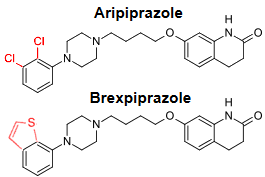
by Correll CU, Skuban A, Ouyang J, Hobart M, Pfister S, McQuade RD, Nyilas M, Carson WH, Sanchez R, and Eriksson H.American Journal of Psychiatry. 2015 172[9]:820-821.
by Kane JM, Skuban, Ouyang, Hobart, Pfister, McQuade, Nyilas, Carson, Sanchez, and Eriksson.Schizophrenia Research. 2015 164[1-3]:127-35.
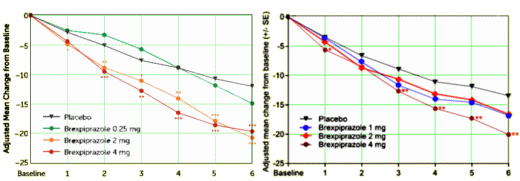
I had found some other articles [prelapse: prequel 1…, prelapse: prequel 2…, and prelapse: but there’s more…]. They were about the Long Acting Injectable versions of the Atypical Antipsychotics coming onto the market now that the drugs themselves have gone off-patent – one of which was an Abilify Injectable.
It’s not working – my doing penance. I’ve been doing the scan-the-journals thing for five or six years, and it hasn’t changed anything. These are just drug company advertisements, the roll out for an Abilify patent-extending campaign. The poor editorial writer could hardly find anything to say about Brexpiprazole. I can hardly think of anything to say about Brexpiprazole. These articles will make good handouts for the drug reps as they go from place to place trying to convince practitioners to prescribe Brexpiprazole [in patent] instead of Abilify [now in generics]. And "yes", the RCTs are lined up for the full complement of indications [notice where the emphasis is]:
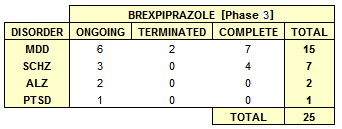
I guess there are some things that have changed. They don’t hire on as many KOLs as they used to – just one per article. The ghost writers still haven’t made it to the author byline, but we immediately know that they’re there. And, for that matter, we didn’t used to even know it was industry funded. It was pretty easy to find the Effect Sizes and compare Brexpiprazole to the other Atypicals. I guess that’s progress of sorts. But it doesn’t change the fact that these are advertisements in a first-line psychiatric journal.
 So I needed a new counter-top Microwave Oven. I moved on to amazon.com and used the "stars" from other shoppers to make my selection. Maybe the American Journal of Psychiatry could institute something like that real soon. It would be easier than making somebody have to think up things to say in an editorial…
So I needed a new counter-top Microwave Oven. I moved on to amazon.com and used the "stars" from other shoppers to make my selection. Maybe the American Journal of Psychiatry could institute something like that real soon. It would be easier than making somebody have to think up things to say in an editorial…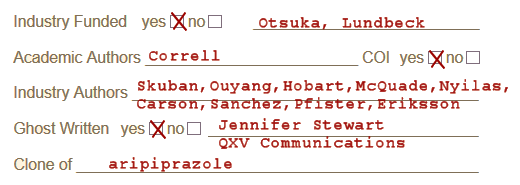
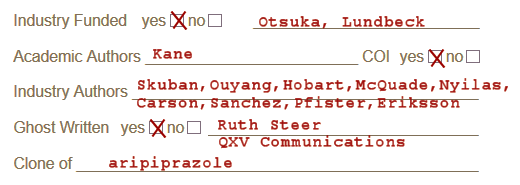
We’ve reached the point where the risk/benefit ratio of browsing journals has tipped over the edge. The potential risk to the over worked clinician of getting subtly sold on a ‘new’ Rx maybe greater than the potential benefit of learning something new. Just reading the abstracts/summaries used be lazy perhaps but nothing worse for those of us outside academia. No longer.
On a slightly different note this is text from a VA training preparing clinicians for ICD-10.
” ICD-9 provides a specific code for reporting Depression, not further specified. However in ICD-10, the use of only the diagnosis “depression” in the health record will be classified to major depression. Therefore, documentation should include whether it is in fact Major Depression, Major Depressive Disorder or if it’s an underlying symptom of another condition such as:
• Bipolar Disorder,
• Mood Disorder
• Or Schizophrenia
I haven’t had time to explore what other conditions, besides the 3 above, can be noted. Given that most depressed mood is treated by primary care it seems likely that a lot of dperesison nos 311 will suddenly become MDD (previously 296.xx) now F32. We’re told that this change to ICD-10 will facilitate public health efforts in population illness tracking, better documentation etc. I have 2 points to make. First the USA has its own version of ICD-10 with 40,000+ additional code compared to Canada / WHO etc. Its fairly obvious that this isn’t about health care but the latest round in the arms race better providers and payers. Second as is often careful explained on this blog we are in the process of loosing the clinical distinction between what was called melancholic depression and reactive depression. This is going to further that process.
I’m sad to inform, that “ghostwriting” is very common on sites that rate Products. The pseudonym “concerned_Dad_35” may sometimes be the actual retailer Writing feedback about an item he wants to sell.
Not quite as serious as ghostwritten scientific papers, but both done with a similar goal.
I know you know all this allready, but still, it feels good for me to be able to give advice back to you. I’m in awe over 1boringoldman. I have Always almost idolized intelligent people, and something tells me this boring older gentleman is the top 1% in that department.
Thanks for the sane voice in this insane World.
From Sweden
I am curious about possibilities for delineating conscientious professional treaters from the rank and file mental health industry complex. A psychiatry/psychology/social work professionals petition to boycott trade journals masquerading as professional journals would show where we are in terms of the corruption of the mental health field professionals. So far, there have only been guesstimates offered by various embedded reporters… usually in the area of 50% —
<>
I’ve realized this since the recovered memories epidemic and the Listening to Prozac era and I focus on review articles and metaanalyses. I am not going to be the doc swept up in the latest fad. Some people don’t mind doing this but I don’t like being misled. I’m still making up my mind on ketamine.
While you are making up your mind, James, check out a pithy review just out in BMJ. It is Zhang MWB et al, Ketamine’s potential as a rapid antidepressant was
overplayed. BMJ 2015;351:h4467 doi: 10.1136/bmj.h4467 (Published 19 August 2015).
Ah but here is a counter view to the same article by Menkes and Glue: Ketamine’s antidepressant effect should not be dismissed prematurely
http://www.bmj.com/content/351/bmj.h4467/rr-0
Right, Tom, and thanks for that update to the on-line Response. It’s a process…
A Getting straight to the heart of the matter:
http://www.cc.com/video-clips/kv1taq/the-colbert-report-cheating-death—depression-edition
For when there just isn’t enough time between patients to scan the current BMJ.
I’m not much of a Colbert fan but I enjoyed that. Given the state of clinical trials, I feel comfortable recommending that segment as an antidepressant in its own right.
After BMJ, still on the fence…getting into new treatments too early is like buying a car in its first model year or getting the new version of Windows too soon…I’m not going to be the beta tester.
This seems an appropriate place for
The FDA Is Basically Approving Everything. Here’s The Data To Prove It
http://www.forbes.com/sites/matthewherper/2015/08/20/the-fda-is-basically-approving-everything-heres-the-data-to-prove-it/
If the FDA can be convinced by the trashy clinical trials with which they’re presented now, why should a company do any better?
Another update on ketamine for anxiety and depression: http://www.ncbi.nlm.nih.gov/pubmed/25582770
“What were once conflicts of interest are now synergies”–defrocked power broker Jack Grubman.
Put that epitaph on the baby boom (which I am a part of) generation’s headstone.